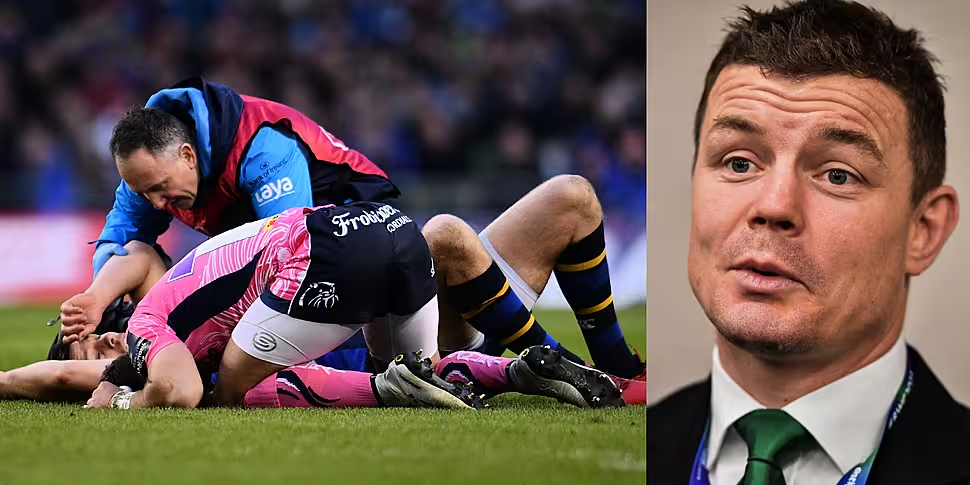Brian O'Driscoll says the recent revelations about rugby's concussion crisis has made him rethink about the way we should even speak about the game.
Steve Thompson and Alix Popham - both in their early 40s - revealed last week they are suffering from early-onset dementia, and are part of a lawsuit against World Rugby and various national governing bodies, about the way head injuries were treated in their careers.
It has sparked a wide-ranging conversation about the changes that need to be made to the game, both in terms of head-injury protocols, but also around basic rules and regulations, with Jamie Cudmore, Keith Wood and Alan Quinlan among those to speak to us over the last week on OTB Sports.
Brian O'Driscoll joined Joe Molloy on the show tonight and says the recent news has caused him to rethink the way he has spoken about the game in the past.
"I've been guilty in the past - and I'm not ashamed to admit it - that I've made reference to, 'Oh the game's going a little bit soft', or, 'How is this being penalised?' two or three years ago, when we started seeing the high shots punished.
"And I have to say I've had a full rethink and the reality of where - besides Steve Thompson and Alix Popham's situation - we need to take care of our players. Prior to that, I felt I shouldn't have been using those sort of terms or phrases. I'm someone that maybe people are listening to.
I've got to be looking at trying to help the game, and the evolution of the game in a positive way, and those sort of comments I don't think help anyone, particularly if we're looking at protecting players.
"The reality is it has always been quite 'gladiatorial' and maybe that terminology is not the terminology we need to use either. I saw a BBC article earlier about Bill Sweeney - the RFU Chief Executive - saying that maybe we need to look at some of the language we're using, talking about 'brutality'.
"Eddie Jones is one that's been a big driver of that, as to how England can mark their territory about being brutally punishing, and maybe those are tactics that we need to look at changing if we're looking to encourage younger players, new generations to come through, because maybe they'll be turned off," O'Driscoll says.
The effectiveness of the HIA is something that has also been spoken about in recent days. Some people have suggested that if a player is removed for a HIA, then it is an indication that there is a suspected concussion and therefore the player should be removed from the game permanently.
O'Driscoll says that while the language used appears contradictory, implementing a "zero-tolerance" policy on any player who may have been suspected of a head injury could, in turn, lead to further issues, with more substitutions, and more fresh players on the pitch, increasing the number of collisions.
"If you don't have HIAs you will need 30 players, 15 and 15 subs, which is another issue that has been spoken about, that it feels as though there's too many changes and so the game remains too high-octane for 80 minutes, and that's why there are these continually big collisions because there are fresh bodies.
"If you've got zero tolerance, the visual side to that will be appalling when you see that number of substitutions. I don't think that's the answer. To be honest, I don't know what the in-between is," he added.
O'Driscoll says the coming months will present us with more information, which needs to be harvested by those in control of the game. And while he freely admits he doesn't have the answers, he says there are some definite things World Rugby can focus on immediately.
"I do think there's a huge amount more science that we need to hear and have relayed to us, and we need to hear more experts. I've read a lot about different studies that have taken place, Dr Willie Stewart in Glasgow and his findings and a lot of what he's talking about is changing the game dramatically, but it's obviously changing how we currently see it as being acceptable to just unacceptable.
"Zero tolerance on high-tackles, some of these ruck clearouts that at the moment we think are acceptable, maybe they are the ones that are causing issues?"
The game is worth saving
"I'm a huge advocate for rugby, I'm a huge fan because of what it gave me. If I wasn't playing professionally or nationally I'd have been playing with my friends because of the underage values and enjoyment I got from it, so the last thing I want to be doing is coming on and bashing it and scrutinising it where it might drag out some negatives, but I don't want to be disingenuous to the facts that are being put to us.
It's trying to find a happy medium to honour those issues that have happened in the last 10-15 years and look for change but also trying to hang to all the aspects of what rugby has offered so many people."
Team of Us. Everyone In.
Vodafone. The main sponsor of the Irish Rugby Team










